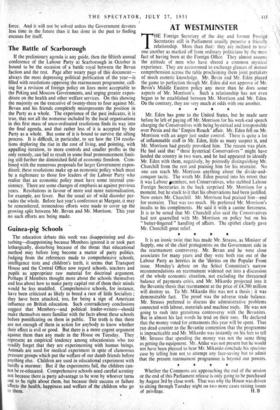The Battle of Scarborough
If the preliminary agenda is any guide, then the fiftieth annual conference of the Labour Party at Scarborough in October is bound to be the occasion of a battle royal between the Bevan faction and the rest. Page after weary page of this document— always the most depressing political publication of the year—is filled with resolutions opposing the rearmament programme, call- ing for a revision of foreign policy on lines more acceptable to the Peking and Moscow Governments, and urging greater expen- diture on the health and other welfare services. On this showing the majority on the executive of twenty-three to four against Mr. Bevan and his friends completely misrepresents the position in the Party as a whole. The experience of the past indicates, it is true, that not all the nonsense included by the local organisations in this first mass of unco-ordinated resolutions finds its way into the final agenda, and that rather less of it is accepted by the Party as a whole. But some of it is bound to survive the sifting process. It is difficult, in particular, to see how the 134 resolu- tions deploring the rise in the cost of living, and pointing, with appalling iteration, to more controls and smaller profits as the only remedy, can fail to result in some final pronouncement limit- ing still further the diminished field of economic freedom. Com- bined with the numerous proposals for larger Government expen- diture; these resolutions make up an economic policy which must be a nightmare to those few leaders of the Labour Party who realise -that an economic policy must have some internal con- sistency. There are some changes of emphasis as against previous years. Resolutions in favour of more and more nationalisation, for example, are fewer. But the usual air of wild disorder per- vades the whole. Before last year's conference at Margate, it may be remembered, tremendous efforts were made to cover up the growing split between Mr. Bevan and Mr. Morrison. This year no such efforts are being made.


































 Previous page
Previous page